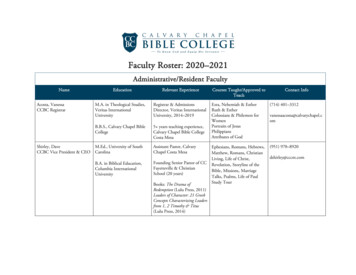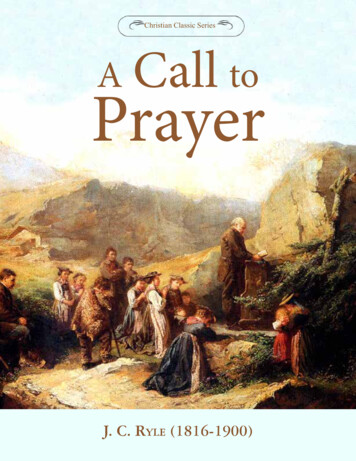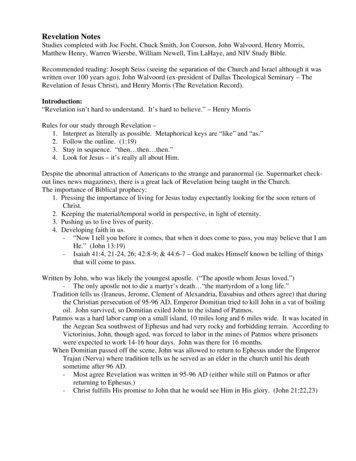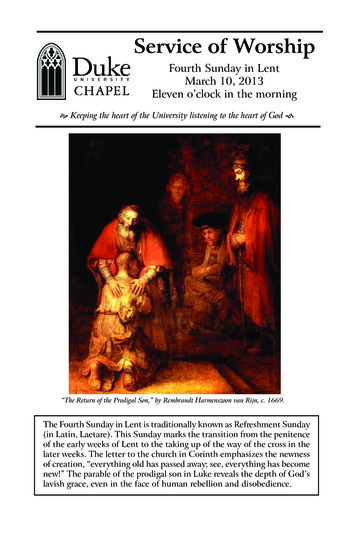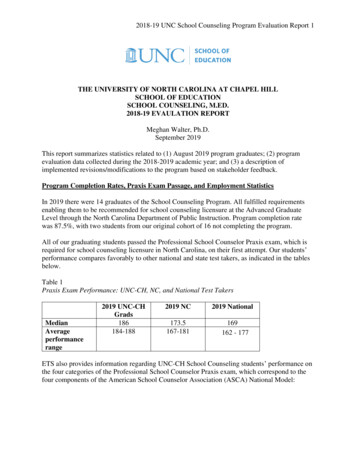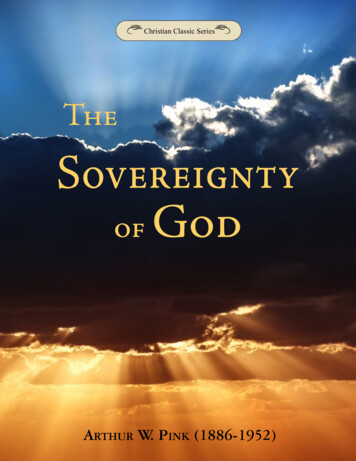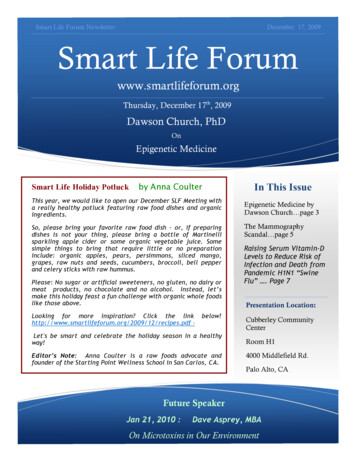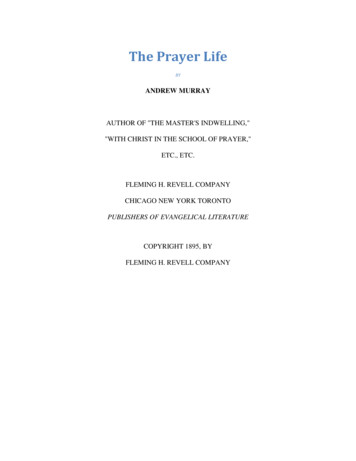
Transcription
The Prayer LifeBYANDREW MURRAYAUTHOR OF "THE MASTER'S INDWELLING,""WITH CHRIST IN THE SCHOOL OF PRAYER,"ETC., ETC.FLEMING H. REVELL COMPANYCHICAGO NEW YORK TORONTOPUBLISHERS OF EVANGELICAL LITERATURECOPYRIGHT 1895, BYFLEMING H. REVELL COMPANY
Forewordfew words with regard to the origin of this book and the object with which it waswritten will help to put the reader into the right position for understanding its teaching.It was the outcome of a conference of ministers at Stellenbosch, South Africa, April 11-14,1912.The occasion of the conference was as follows: Professor de Vos, of our Theological Seminary,had written a letter to the ministers of our church (Dutch Reformed Church) concerning the lowstate of spiritual life which marked the Church (universal) generally, which, (he said), ought tolead to the inquiry as to how far that statement included our church too. What had been said inthe book, The State of the Church, called for deep searching of heart. He thought there could beno doubt about the truth of the statement in regard to the lack of spiritual power. He askedwhether it was not time for us to come together and in God's presence to find out what might bethe cause of the evil. He wrote: 'If only we study the conditions in all sincerity, we shall have toacknowledge that our unbelief and sin are the cause of the lack of spiritual power; that thiscondition is one of sin and guilt before God, and nothing less than a direct grieving of God'sHoly Spirit.'His invitation met with a hearty response. Our four theological professors, with more than twohundred ministers, missionaries, and theological students, came together with the above words asthe keynote of our meeting. From the very first, in the addresses there was the tone of confessionas the only way to repentance and restoration. At a subsequent meeting the opportunity wasgiven for testimony as to what might be the sins which made the life of the Church so feeble.Some began to mention failings that they had seen in other ministers, either in conduct, or indoctrine, or in service. It was soon felt that this was not the right way; each must acknowledgethat in which he himself was guilty.The Lord graciously so ordered it that we were gradually led to the sin of prayerlessness as oneof the deepest roots of the evil. No one could plead himself free from this. Nothing so reveals thedefective spiritual life in minister and congregation as the lack of believing and unceasingprayer. Prayer is in very deed the pulse of the spiritual life. It is the great means of bringing tominister and people the blessing and power of heaven. Persevering and believing prayer means astrong and an abundant life.When once the spirit of confession began to prevail, the question arose as to whether it would beindeed possible to expect to gain the victory over all that had in the past hindered our prayer life.In smaller conferences held previously, it had been found that many were most anxious to makea new beginning and yet had not the courage to expect that they would be able to maintain thatprayer life which they saw to be in accordance with the Word of God. They had often made theattempt but had failed. They did not dare to make any promise to the Lord to live and pray as hewould have them; they felt it impossible. Such confessions gradually led to the great truth, thatthe only power for a new prayer life is to be found in an entirely new relation to our blessedSaviour. It is as we see in him the Lord who saves us from sin - the sin of prayerlessness too and our faith yields itself to a life of closer intercourse with him, that a life in his love andfellowship will make prayer to him the natural expression of our soul's life. Before we parted,
many were able to testify that they were returning with new light and new hope to find in JesusChrist strength for a new prayer life.
THE PRAYER LIFEAN AID TO ITS ATTAINMENTTable of ContentsForewordThe Sin and Cause of PrayerlessnessThe Fight Against PrayerlessnessHow To Be Delivered from Prayerlessness;How Deliverance May ContinueThe Blessing of Victory; The More Abundant LifeThe Example of Our LordThe Holy Spirit and PrayerSin vs The Holiness of GodObedience; The Victorious LifeHints-for the Inner Chamber; TimeThe Example of PaulThe Word and Prayer; Preaching and Prayer; Wholeheartedness'Follow Me'; The Holy Trinity; Life and Prayer;Perseverance in Prayer; Carnal or SpiritualGeorge Mueller; Hudson Taylor; Light from the Inner ChamberThe Cross Spirit in Our LordTaking Up the CrossThe Holy Spirit and the CrossA Testimony & An EpilogueAbout the Author
Chapter 1The Sin and Cause of Prayerlessnessf conscience is to do its work, and the contrite heart is to feel its misery, it is necessarythat each individual should mention his sin by name. The confession must be severelypersonal. In a meeting of ministers there is probably no single sin which each one of usought to acknowledge with deeper shame -'Guilty, verily guilty' - than the sin of prayerlessness.What is it, then, that makes prayerlessness such a great sin? At first it is looked upon merely as aweakness. There is so much talk about lack of time and all sorts of distractions that the deep guiltof the situation is not recognised. Let it be our honest desire that, for the future, the sin ofprayerlessness may be to us truly sinful. Consider1. What a reproach it is to GodThere is the holy and most glorious God who invites us to come to him, to hold converse withhim, to ask from him such things as we need, and to experience what a blessing there is infellowship with him. He has created him we might find our highest glory and salvation.What use do we make of this heavenly privilege? How many there are who take only fiveminutes for prayer! They say that they have no time and that the heart desire for prayer islacking; they do not know how to spend half an hour with God! It is not that they absolutely donot pray; they pray every day - but they have no joy in prayer, as a token of communion withGod which shows that God is everything to them.If a friend comes to visit them, they have time, they make time, even at the cost of sacrifice, forthe sake of enjoying converse with him. Yes, they have time for everything that really intereststhem, but no time to practise fellowship with God and delight themselves in him! They find timefor a creature who can be of service to them; but day after day, month after month passes, andthere is no time to spend one hour with God.Do not our hearts begin to acknowledge what a dishonour, what a despite of God this is, that Idare to say I cannot find time for fellowship with him? If this sin begins to appear plain to us,shall we not with deep shame cry out: 'Woe is me, for I am undone, 0 God; be merciful to me,and forgive this awful sin of prayerlessness.' Consider further2. It is the cause of a deficient spiritual lifeIt is a proof that, for the most part, our life is still under the power of 'the flesh'. Prayer is thepulse of life; by it the doctor can tell what is the condition of the heart. The sin of prayerlessnessis a proof for the ordinary Christian or minister that the life of God in the soul is in deadlysickness and weakness.Much is said and many complaints are made about the feebleness of the Church to fulfill hercalling, to exercise an influence over her members, to deliver them from the power of the world,and to bring them to a life of holy consecration to God. Much is also spoken about herindifference to the millions of heathen whom Christ entrusted to her that she might make knownto them his love and salvation. What is the reason that many thousands of Christian workers in
the world have not a greater influence? Nothing save this - the prayerlessness of their service. Inthe midst of all their zeal in the study and in the work of the Church, of all their faithfulness inpreaching and conversation with the people, they lack that ceaseless prayer which has attached toit the sure promise of the Spirit and the power from on high. It is nothing but the sin ofprayerlessness which is the cause of the lack of a powerful spiritual life! Consider further3. The dreadful loss which the Church suffers as a result of the prayerlessness of the ministerIt is the business of a minister to train believers up to a life of prayer; but how can a leader dothis if he himself understands little the art of conversing with God and of receiving from theHoly Spirit, every day, out of heaven, abundant grace for himself and for his work? A ministercannot lead a congregation higher than he is himself. He cannot with enthusiasm point out a way,or explain a work, in which he is not himself walking or living.How many thousands of Christians there are who know next to nothing of the blessedness ofprayer fellowship with God! How many there are who know something of it and long for afurther increase of this knowledge, but in the preaching of the Word they are not persistentlyurged to keep on till they obtain the blessing! The reason is simply and only that the ministerunderstands so little about the secret of powerful prayer and does not give prayer the place in hisservice which, in the nature of the case and in the will of God, is indispensably necessary. Oh,what a difference we should notice in our congregations if ministers could be brought to see inits right light the sin of prayerlessness and were delivered from it! Once more consider4. The impossibility of preaching the gospel to all men-as we are commanded by Christ to do so long as this sin is not overcome and cast out.Many feel that the great need of missions is the obtaining of men and women who will givethemselves to the Lord to strive in prayer for the salvation of souls. It has also been said that Godis eager and able to deliver and bless the world he has redeemed, if his people were but willing,if they were but ready, to cry to him day and night But how can congregations be brought to thatunless there comes first an entire change in ministers and that they begin to see that theindispensable thing is not preaching, not pastoral visitation, not church work, but fellowship withGod in prayer till they are clothed with power from on high?Oh, that all thought and work and expectation concerning the kingdom might drive us to theacknowledgement of the sin of prayerlessness! God help us to root it out! God deliver us from itthrough the blood and power of Christ Jesus! God teach every minister of the Word to see what aglorious place he may occupy if he first of all is delivered from this root of evils; so that withcourage and joy, in faith and perseverance, he can go on with his God!The sin of prayerlessness! The Lord lay the burden of it so heavy on our hearts that we may notrest till it is taken far from us through the name and power of Jesus He will make this possiblefor us.A witness from AmericaIn 1898, there were two members of the Presbytery in New York who attended the NorthfieldConference for the deepening of the spiritual life. They returned to their work with the fire of anew enthusiasm. They endeavoured to bring about a revival in the entire Pres bytery. In ameeting which they held, the chairman was guided to ask the brethren a question concerning
their prayer life: 'Brethren,' said he, 'let us today make confession before God and each other. Itwill do us good. Will everyone who spends half an hour every day with God in connection withhis work hold up a hand?' One hand was held up. He made a further request: 'All who thus spendfifteen minutes hold up a hand.' Not half of the hands were held up. Then he said: 'Prayer, theworking power of the Church of Christ, and half of the workers make hardly any use of it! Allwho spend five minutes hold up hands.' All hands went up. But one man came later with theconfession that he was not quite sure if he spent five minutes in prayer every day. 'It is,' said he,'a terrible revelation of how little time I spend with God.'The cause of prayerlessness.In an elder's prayer meeting, a brother put the question: 'What, then, is the cause of so muchprayerlessness? Is it not unbelief?'The answer was: 'Certainly; but then comes the question what is the cause of that unbelief?'When the disciples asked the Lord Jesus: 'Why could not we cast the devil out?' His answer was:'Because of your unbelief.' He went further and said: 'Howbeit this kind goeth not out but byprayer and fasting' (Matt. 17.19-21). If the life is not one of self-denial - of fasting - that is,letting the world go; of prayer - that is, laying hold of heaven, faith cannot be exercised. A lifelived according to the flesh and not according to the Spirit - it is in this that we find the origin ofthe prayerlessness of which we complain. As we came out of the meeting a brother said to me:'That is the whole difficulty; we wish to pray in the Spirit and at the same time walk after theflesh, and this is impossible.'If one is sick and desires healing, it is of prime importance that the true cause of the sickness bediscovered. This is always the first step toward recovery. If the particular cause is not recognised,and attention is directed to subordinate causes, or to supposed but not real causes, healing is outof the question. In like manner, it is of the utmost importance for us to obtain a correct insightinto the cause of the sad condition of deadness and failure in prayer in the inner chamber, whichshould be such a blessed place for us. Let us seek to realise fully what is the root of this evil.Scripture teaches us that there are but two conditions possible for the Christian. One is a walkaccording to the Spirit, the other a walk according to 'the flesh'. These two powers are inirreconcilable conflict with each other. So it comes to pass, in the case of the majority ofChristians, that, while we thank God that they are born again through the Spirit and havereceived the life of God - yet their ordinary daily life is not lived according to the Spirit butaccording to 'the flesh'. Paul writes to the Galatians: 'Are ye so foolish? having begun in theSpirit, are ye now made perfect by the flesh?' (Gal. 3.3). Their service lay in fleshly outwardperformances. They did not understand that where 'the flesh' is permitted to influence theirservice of God, it soon results in open sin.So he mentions not only grave sins as the work of 'the flesh', such as adultery, murder,drunkenness; but also the more ordinary sins of daily life - wrath, strife, variance; and he givesthe exhortation: 'Walk in the Spirit, and ye shall not fulfill the lust of the flesh. If we live in theSpirit, let us also walk in the Spirit' (Gal. 5.16, 25). The Spirit must be honoured not only as theauthor of a new life but also as the leader and director of our entire walk. Otherwise we are whatthe apostle calls 'carnal'.
The majority of Christians have little understanding of this matter. They have no real knowledgeof the deep sinfulness and godlessness of that carnal nature which belongs to them and to whichunconsciously they yield. 'God. condemned sin in the flesh' (Rom. 8.3) - in the cross of Christ.'They that are Christ's have crucified the flesh with the affections and lusts' (Gal. 5.24). 'Theflesh' cannot be improved or sanctified. 'The carnal mind is enmity against God; for it is notsubject to the law of God, neither indeed can be' (Rom. 8.7). There is no means of dealing with'the flesh' save as Christ dealt with it, bearing it to the cross. 'Our old man is crucified with him'(Rom. 6.6); so we by faith also crucify it, and regard and treat it daily as an accursed thing thatfinds its rightful place on the accursed cross.It is saddening to consider how many Christians there are who seldom think or speak earnestlyabout the deep and immeasurable sinfulness of 'the flesh'-'In me (that is, in my flesh) dwelleth nogood thing'(Rom. 7.18). The man who truly believes this may well cry out: 'I see another law inmy members . bringing me into captivity to the law of sin. 0 wretched man that I am! whoshall deliver me from the body of this death?' (Rom. 7.23, 24). Happy is he who can go furtherand say: 'I thank God, through Jesus Christ our Lord. For the law of the Spirit of life in ChristJesus hath made me free from the law of sin and death' (Rom. 7.25; 8.2).Would that we might understand God's counsels of grace for us! 'The flesh' on the cross - theSpirit in the heart and controlling the life.This spiritual life is too little understood or sought after; yet it is literally what God has promisedand will accomplish in those who unconditionally surrender themselves to him for this purpose.Here then we have the deep root of evil as the cause of a prayerless life. 'The flesh' can sayprayers well enough, calling itself religious for so doing and thus satisfying conscience. But 'theflesh' has no desire or strength for the prayer that strives after an intimate knowledge of God; thatrejoices in fellowship with him; and that continues to lay hold of his strength. So, finally, itcomes to this, 'the flesh' must be denied and crucified.The Christian who is still carnal has neither disposition nor strength to follow after God. He restssatisfied with the prayer of habit or custom; but the glory, the blessedness of secret prayer is ahidden thing to him, till some day his eyes are opened, and he begins to see that 'the flesh', in itsdisposition to turn away from God, is the archenemy which makes powerful prayer impossiblefor him.I had once, at a conference, spoken on the subject of prayer and made use of strong expressionsabout the enmity of 'the flesh' as a cause of prayerlessness. After the address, the minister's wifesaid that she thought 1 had spoken too strongly. She also had to mourn over too little desire forprayer, but she knew her heart was sincerely set on seeking God. 1 showed her what the word ofGod said about 'the flesh', and that everything which prevents the reception of the Spirit isnothing else than a secret work of 'the flesh'. Adam was created to have fellowship with God andenjoyed it before his fall. After the fall, however, there came immediately, a deep- seatedaversion to God, and he fled from him. This incurable aversion is the characteristic of theunregenerate nature and the chief cause of our unwillingness to surrender ourselves to fellowshipwith God in prayer. The following day she told me that God had opened her eyes; she confessed
that the enmity and unwillingness of 'the flesh' was the hidden hindrance in her defective prayerlife.0 my brethren, do not seek to find in circumstances the explanation of this prayerlessness overwhich we mourn; seek it where God's word declares it to be, in the hidden aversion of the heartto a holy God.When a Christian does not yield entirely to the leading of the Spirit - and this is certainly the willof God and the work of his grace - he lives, without knowing it, under the power of 'the flesh'.This life of 'the flesh' manifests itself in many different ways. It appears in the hastiness of spirit,or the anger which so unexpectedly arises in you, in the lack of love for which you have so oftenblamed yourself; in the pleasure found in eating and drinking, about which at times yourconscience has chidden you; in that seeking for your own will and honour, that confidence inyour own wisdom and power, that pleasure in the world, of which you are sometimes ashamedbefore God. All this is life 'after the flesh'. 'Ye are yet carnal' (1 Con 3.3) that text, perhaps,disturbs you at times; you have not full peace and joy in God.I pray you take time and give an answer to the question: Have 1 not found here the cause of myprayerlessness, of my powerlessness to effect any change in the matter? I live in the Spirit, 1have been born again, but 1 do not walk after the Spirit -'the flesh' lords it over me. The carnallife cannot possibly pray in the spirit and power. God forgive me. The carnal life is evidently thecause of my sad and shameful prayerlessness.The storm centre on the battlefieldMention was made in conference of the expression 'strategic position' used so often in referenceto the great strife between the kingdom of heaven and the powers of darkness.When a general chooses the place from which he intends to strike the enemy, he pays mostattention to those points which he thinks most important in the fight. Thus there was on thebattlefield of Waterloo a farmhouse which Wellington immediately saw was the key to thesituation. He did not spare his troops in his endeavours to hold that point: the victory dependedon it. So it actually happened. It is the same in the conflict between the believer and the powersof darkness. The inner chamber is the place where the decisive victory is obtained.The enemy uses all his power to lead the Christian and above all the minister, to neglect prayer.He knows that however admirable the sermon may be, however attractive the service, howeverfaithful the pastoral visitation, none of these things can damage him or his kingdom if prayer isneglected. When the Church shuts herself up to the power of the inner chamber, and the soldiersof the Lord have received on their knees 'power from on high', then the powers of darkness willbe shaken and souls will be delivered. In the Church, on the mission field, with the minister andhis congregation, everything depends on the faithful exercise of the power of prayer.In the week of conference I found the following in The Christian:Two persons quarrel over a certain point. We call them Christian and Apollyon. Apollyonnotices that Christian has a certain weapon which would give him a sure victory. They meet indeadly strife, and Apollyon resolves to take away the weapon from his opponent and destroy it.
For the moment the main cause of the strife has become subordinate; the great point now is whoshall get possession of the weapon on which everything depends? It is of vital importance to gethold of that.So it is in the conflict between Satan and the believer. God's child can conquer everything byprayer. Is it any wonder that Satan does his utmost to snatch that weapon from the Christian, orto hinder him in the use of it?How now does Satan hinder prayer? By temptation to postpone or curtail it, by bringing inwandering thoughts and all sorts of distractions; through unbelief and hopelessness. Happy is theprayer hero who, through it all, takes care to hold fast and use his weapon. Like our Lord inGethsemane, the more violently the enemy attacked the more earnestly he prayed and ceased nottill he had obtained the victory. After all the other parts of the armour had been named, Pauladds: 'with all prayer and supplication in the Spirit' (Eph. 6.18). Without prayer, the helmet ofsalvation, and the shield of faith, and the sword of the Spirit which is God's word, have nopower. All depends on prayer. God teach us to believe and hold this fast!
Chapter 2The Fight Against Prayerlessnesss soon as the Christian becomes convinced of his sin in this matter, his first thought isthat he must begin to strive, with God's help, to gain the victory over it. But alas, hesoon experiences that his striving is worth little, and the discouraging thought comesover him, like a wave, that such a life is not for him - he cannot continue faithful! At conferenceson the subject of prayer, held during the past years, many a minister has openly said that itseemed impossible for him to attain such a strict life.Recently I received a letter from a minister, well known for his ability and devotion, in which hewrites, 'As far as I am concerned, it does not seem to help me to hear too much about the life ofprayer, about the strenuous exertion for which we must prepare ourselves, and about all the timeand trouble and endless effort it will cost us. These things discourage me - I have so often heardthem. I have time after time put them to the test, and the result has always been sadlydisappointing. It does not help me to be told: "You must pray more, and hold a closer watch overyourself, and become altogether a more earnest Christian.My reply to him was as follows: 'I think in all I spoke at the conference or elsewhere, 1 havenever mentioned exertion or struggle, because I am so entirely convinced that our efforts arefutile unless we first learn how to abide in Christ by a simple faith.'My correspondent said further: 'The message I need is this: "See that your relationship to yourliving Saviour is what it ought to be. Live in his presence, rejoice in his love, rest in him.---Abetter message could not be given, if it is only rightly understood. 'See that your relationship tothe living Saviour is what it ought to be.' But this is just what will certainly make it possible forone to live the life of prayer.We must not comfort ourselves with the thought of standing in a right relationship to the LordJesus while the sin of prayerlessness has power over us, and while we, along with the wholeChurch, have to complain about our feeble life which makes us unfit to pray for ourselves, forthe Church, or for missions, as we ought. But if we recognise, in the first place, that a rightrelationship to the Lord Jesus, above all else, includes prayer, with both the desire and power topray according to God's will, then we have something which gives us the right to rejoice in himand to rest in him.I have related this incident to point out how naturally discouragement will be the result of selfeffort and will so shut out all hope of improvement or victory. And this indeed is the condition ofmany Christians when called on to persevere in prayer as intercessors. They feel it is certainlysomething entirely beyond their reach - they have not the power for the self-sacrifice andconsecration necessary for such prayer; they shrink from the effort and struggle which will, asthey suppose, make them unhappy. They have tried in the power of the flesh to conquer the flesh- a wholly impossible thing. They have endeavoured by BeeIzebub to cast out BeeIzebub andthis can never happen. It is Jesus alone who can subdue the flesh and the devil.
We have spoken of a struggle which will certainly result in disappointment and discouragement.This is the effort made in our own strength. But there is another struggle which will certainlylead to victory. The Scripture speaks of 'the good fight of faith', that is to say, a fight whichsprings from and is carried on by faith. We must get right conceptions about faith and stand fastin our faith. Jesus Christ is ever the author and finisher of faith. It is when we come into rightrelationship with him that we can be sure of the help and power he bestows. Just, then, asearnestly as we must, in the first place. say: 'Do not strive in your own strength; cast yourself atthe feet of the Lord Jesus, and wait upon him in the sure confidence that he is with you, andworks in you'; so do we, in the second place, say: 'Strive in prayer; let faith fill your heart - sowill you be strong in the Lord, and in the power of his might.'An illustration will help us to understand this. A devoted Christian woman who conducted alarge Bible class with zeal and success once came in trouble to her minister. In her earlier yearsshe had enjoyed much blessing in the inner chamber, in fellowship with the Lord and his word.But this had gradually been lost and, do what she would, she could not get right. The Lord hadblessed her work, but the joy had gone out of her life. The minister asked what she had done toregain the lost blessedness. 'I have done everything,' said she, 'that 1 can think of, but all in vain.'He then questioned her about her experience in connection with her conversion. She gave animmediate and clear answer: 'At first I spared no pains in my attempt to become better, and tofree myself from sin, but it was all useless. At last 1 began to understand that I must lay aside allmy efforts, and simply trust the Lord Jesus to bestow on me his life and peace, and he did it.''Why then,' said the minister, 'do you not try this again? As you go to your inner chamber,however cold and dark your heart may be, do not try in your own might to force yourself into theright attitude. Bow before him, and tell him that he sees in what a sad state you are that your onlyhope is in him. Trust him with a childlike trust to have mercy upon you, and wait upon him. Insuch a trust you are in a right relationship to him. You have nothing he has everything.' Sometime later she told the minister that his advice had helped her; she had learned that faith in thelove of the Lord Jesus is the only method of getting into fellowship with God in prayer.Do you not begin to see, my reader, that there are two kinds of warfare - the first when we seekto conquer prayerlessness in our own strength. In that case, my advice to you is: 'Give over yourrestlessness and effort; fall helpless at the feet of the Lord Jesus; he will speak the word, andyour soul will live.' If you have done this, then, second, comes the message: 'This is but thebeginning of everything. It will require deep earnestness, and the exercise of all your power, anda watchfulness of the entire heart - eager to detect the least backsliding. Above all, it will requirea surrender to a life of self sacrifice that God really desires to see in us and which he will workout for us.'
Chapter 3How To Be Delivered from Prayerlessness; How Deliverance May Continuehe greatest stumbling-block in the way of victory over prayerlessness is the secretfeeling that we shall never obtain the blessing of being delivered from it. Often have weput forth effort in this direction, but in vain. Old habit and the power of the flesh, oursurroundings with their attractions, have been too strong for us. What good is it to attempt thatwhich our heart assures us is out of our reach? The change needed in the entire life is too greatand too difficult. If the question is put: 'Is a change possible?' our sighing heart says: 'Alas
prayer. Prayer is in very deed the pulse of the spiritual life. It is the great means of bringing to minister and people the blessing and power of heaven. Persevering and believing prayer means a strong and an abundant life. When once the spirit of confession began
